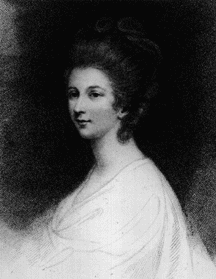Right now, freelancers are living in tumultuous times. One successful 18th-century writer understood the struggle better than most—and what was true in her time is still useful in learning how to become a freelance writer today.
Charlotte Lennox (née Ramsay)—a novelist whose work would later inspire Jane Austen—had a position lined up as a lady’s companion, but the role fell through when her employer succumbed to a sudden mental illness.
Alone in England, she nonetheless found ways to pursue her writing and get her first book published. In this post I’ll share how to become a freelance writer by following Charlotte’s timeless wisdom, plus practical tips for integrating these strategies into your own writing practice. We’ll cover:
- Getting noticed, even if you don’t have any connections
- Building your writing network (sadly we can’t all be BFFs with Samuel Johnson)
- Creating a sustainable career that fulfills you creatively and financially
But first, some background. Like many writers, Charlotte’s literary interests began early. Growing up in the colony of New York in the 1740s (her father was a British army captain), she scribbled verses and shared these poems for the amusement of family and friends.
💔 Break up with bad clients: There are better clients waiting for you. And SolidGigs can help you find them. Get a team of gig-hunters and a custom dashboard. Starting at just $31/mo. Learn more »
When she was a teenager, her rich widowed aunt, Mrs Lucking of Messing Hall, wrote to request Charlotte come stay with her in England, as her companion. But as Charlotte crossed the Atlantic, Mrs. Lucking’s son (Charlotte’s cousin) died suddenly, causing her aunt to have a mental breakdown.
When Charlotte got off the boat, she was met with the devastating news: Her aunt was incapacitated, meaning Charlotte could not live with her.
What happened next was nothing short of extraordinary.
A Turning of the Tide
Instead of turning around and taking the next boat home, Charlotte stayed in England. She circulated her poems and started to make waves as an up-and-coming writer. Her writing caught the attention of Lady Isabella Finch, a noblewoman and literature aficionado, who soon took Charlotte under her wing.
Within a few fleet years, Charlotte was rubbing elbows with some of the most important writers of her era—Samuel Johnson, Henry Fielding, and Samuel Richardson—and had published her first book.
How did she do it? There was certainly an element of luck. But there was also a lot of hard work that went into perfecting her writing, making the right connections, and sustaining a lifelong writing career. Here’s a modern take on how to become a freelance writer, following Charlotte Lennox’s example.
1. Getting noticed: Produce exceptional quality work first, focus on self-promotion second
When many freelancers first start out, they pursue the trappings of a professional writer. They build a website, set up social media accounts, or otherwise try to promote their services. But these self-promotional tools—while useful—serve no purpose without quality writing to back up the implicit promise they make: that their writing can be trusted.
When Charlotte landed in England, she wasn’t focused on trying to promote her writing to a new audience. She did what she’d always done, writing poems and circulating them through her network of new friends and acquaintances.
People enjoyed her poems so much they couldn’t help but share them—which in those days meant they copied them down by hand and shared the manuscripts with their friends. Charlotte didn’t push people to read her work, she wrote the kinds of things people wanted to read. And that’s a lot harder than setting up a Twitter account.
Learn From Charlotte
That’s not to say that Charlotte wasn’t tactical about how she shared her writing. She wrote sociable verse, the most shareable content of the day, which she knew people would circulate if they enjoyed reading it. And she signed her poems with her name—unusual for a woman at this time—indicating that she wanted to be known as a writer.
There’s a place for self-promotion. But self-promotion should be secondary to the main event: creating work that enlightens and informs, uncovers interesting new angles on old topics, or resonates with peoples’ deeply-held experiences.
What’s the secret to producing high-caliber writing like this? Time and practice. There are no easy shortcuts to generating exceptional quality work—that’s what makes it so rare and valuable. But there are ways to make sure you’re learning how to become a freelance writer who manages their writing time effectively and progresses their skills. I’ve outlined a few strategies in the tips below.
2. Prioritize effectively
Make sure you’re spending the majority of your core working hours on writing. You may want to schedule writing time for first thing in the morning when you’re most fresh and leave promotion-related tasks—which are typically less mentally demanding—for the afternoon when you’re more tired.
3. Keep a writing log
American philosopher Jason Brennan, who has authored (or co-authored) more than seven books and countless articles, recommends logging at least 20 hours of focused writing time per week and keeping track of it. And no cheating! When you’re in a writing block, stay focused. Don’t check your email. Don’t quickly glance at Twitter. Just write.
- Avoid looping. Ever caught yourself rewriting the same paragraph for the fifth time or fiddling with a sentence for more than twenty minutes until it was just right? You might have been caught in a thought loop. This is where your brain defaults to old patterns to avoid the hard work of generating new ideas. The key to stopping loops is noticing that you’re in one, which is challenging, but possible. Developing your mindfulness skills—whether that’s a formal meditation habit or just the daily practice of becoming more present—can help you better recognize and stop thought loops in their tracks.
4. Networking like a pro: Make friends with freelancers in the same phase of their career
Freelancing can be lonely work. You’re likely working remotely and interacting with clients primarily through email—maybe the occasional Zoom call. All this isolation can take a toll on your mental health: A recent survey found that freelancers are nearly twice as likely to be depressed than office workers and report loneliness at much higher rates.
Sixty-four percent of freelancers say they are lonely compared to only twenty-nine percent of office workers. Because the nature of the work is so solitary, it’s crucial to learn how to become a freelance writer with a support network.
Charlotte Lennox understood this challenge well. Even though she had a patron in Lady Isabella Finch, their goals were often misaligned: Lady Isabella saw Charlotte’s writing as a gateway to achieving higher status—the sort of “polite accomplishment” that could land her a paid position at court, or better yet, a wealthy husband.
But Charlotte wasn’t interested in climbing the social ladder; she wanted to make a career out of her writing. To gain support for her goals, she needed to make friends with people who could empathize—her fellow writers.
Charlotte found one such supporter in Samuel Johnson, a writer best known for creating the first English dictionary. The two met just as both of their literary careers were starting to blossom in the early 1750s. They became fast friends, reviewing each other’s work, introducing each other to new contacts, and celebrating each other’s successes.
In fact, it’s only because of Samuel Johnson that Charlotte met another Samuel—Samuel Richardson—an established writer who helped publish her wildly successful novel, The Female Quixote.

Likewise, finding your peers will be crucial not only for your mental well-being, but also your career success. So how do you find your people? It can be challenging, especially when quarantining. But there are things you can do to build your writerly network, even from a distance.
5. Deepen an existing connection
You might already have some professional connections you could cultivate into deeper friendships—ask them for a (virtual) coffee date or start a conversation about something they’ve recently written—chances are they’ll be more than happy to talk about it
6. Join a local writing group or coworking space
Depending on where you live, it may or may not be possible to do in-person meetups at the moment, but plenty of local groups have gone digital for the time being—and they’ll return to normal in the future. Try searching the site Meetup for writers’ groups or see if any local coworking spaces or libraries are running events (physical or virtual) for freelancers.
7. Find an online community
The internet offers no shortage of opportunities for writers to connect. While these groups may be less intimate than local communities, they can still be a great resource—you may just need to be a bit more deliberate in cultivating meaningful friendships. To start, try checking out these Slack groups for writers.
8. Sustaining your career: Use the writing that pays well to fund your passion projects
For most of us, there’s a disconnect between the writing we absolutely love to do and the writing that pays well. And that’s okay. The skill is balance: You can leverage the writing that’s in demand to fund your fun writing—whether that’s blogging, screenwriting, or even (like Charlotte) writing your first novel.

Eventually, one of these passion projects may become your primary source of income. But until then, you still have to eat.
Let’s look at Charlotte. For her whole life, she was a working writer. “Her career was not made in a tapestry-lined room, or even a quiet cottage, where she could write wherever the spirit moved,” writes scholar Susan Carlile. “Her words…had to support not only her material needs, but sometimes her husband and eventually their daughter and son.”
She didn’t have the luxury of only working on her poetry and novels. Instead, she worked on a variety of projects, including translations of foreign-language novels and memoirs for an English audience.
In Lennox’s day, translations of popular foreign works were a literary goldmine. Today, the writing that pays well takes other forms. One key opportunity is B2B writing—an industry ripe with possibility (and in dire need of some clever wordsmiths).
Brands are willing to pay skilled writers well above market rates for clear and compelling writing. And the writing they need takes many forms, from content marketing to technical writing.
So how do you balance it all—put food on the table and still leave room for the writing that fulfills you creatively? It’s not always easy, but some of the strategies on how to become a freelance writer listed below can help.
9. Develop a lucrative writing specialty.
Carve out a niche for yourself that’s in line with your interests, but also with what’s in demand in the market. Maybe you love human-centered design and can develop your skills as a UX writer. Or you have great social media savvy and can craft compelling copy for brands’ social media accounts. Whatever it is, become an expert in it. Your goal is to become your client’s go-to person for that particular kind of writing.
10. Create a sales process
Freelancers often get caught in a cycle of feast and famine. But if you have a steady stream of incoming sales pipeline, you’ll also have a steady stream of work. A sales process takes time to create, but saves time in the long run—not to mention significantly reducing stress and financial hardship.
11. Put your passion projects on your calendar
Just because they’re not your primary source of income right now, it doesn’t mean they’re not important. Your fun writing works to develop your writing skills just as much as the writing that pays the bills. Commit to taking time every week for the writing that brings you joy.
Final Thoughts
From humble beginnings, Charlotte Lennox went on to have a long and fruitful writing career, publishing six novels as well as poems, plays, and even works of literary criticism. While she lived and wrote in very different circumstances to modern freelancers, her life nonetheless offers many hints on how to become a freelance writer today.
By prioritizing writing quality over promotion, building a support network of like-minded peers, and developing your career in a way that’s sustainable for both your financial and creative needs, you’ll be well on your way to launching a successful freelance writing career. Charlotte would be proud.
Source material about Charlotte Lennox’s life comes from Susan Carlile’s excellent biography, Charlotte Lennox: An Independent Life.
Keep the conversation going...
Over 10,000 of us are having daily conversations over in our free Facebook group and we'd love to see you there. Join us!



